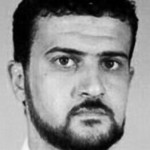 In separate raids, U.S. Navy SEALs carried out a predawn strike in Somalia aimed at capturing a senior leader of the al-Shabaab militant group, while a group of U.S. commandos in Libya captured a man suspected of taking part in the 1998 American Embassy bombings in east Africa.
In separate raids, U.S. Navy SEALs carried out a predawn strike in Somalia aimed at capturing a senior leader of the al-Shabaab militant group, while a group of U.S. commandos in Libya captured a man suspected of taking part in the 1998 American Embassy bombings in east Africa.
The raid in Somalia Friday failed to capture the senior militant and it isn’t clear if he was killed, although several al-Shabaab members were killed, according to an official. But the U.S. military, in an operation with the CIA and FBI, succeeded Saturday in capturing Nazih Abdul-Hamed al-Ruqai, a militant known as Abu Anas al-Libi who was on the FBI most wanted list with a $5 million reward.
Although the Obama administration has used deadly force in many of its counterterrorism strikes, the twin raids were aimed explicitly at capturing the accused militants.
“I can confirm that yesterday, October 4, U.S. military personnel were involved in a counterterrorism operation against a known al-Shabaab terrorist,” said Pentagon Press Secretary George Little. “We aren’t prepared to provide additional detail at this time.”
Al-Shabaab has claimed responsibility for the deadly attack at a Nairobi shopping mall. But the raid wasn’t a direct response to the attack on the mall, according to the U.S. official.
In a separate statement on Sunday, Mr. Little confirmed that the U.S. had apprehended Abu Anas in Libya on Saturday.
Mr. Little said the raid was conducted under military authorities. Unlike the CIA, which can enter a country covertly, the military’s special operation forces generally require some level of cooperation from partner nations before conducting an operation on their territory. Still because Abu Anas was an indicted al Qaeda leader, the 2001 Authorization for the Use of Military force, does give the U.S. broad latitude to conduct military operations to capture or kill members of the group.
Abu Anas is being held outside Libya, Mr. Little said, pursuant to the military’s detention powers under the law of war. That could enable military on CIA interrogators to question Abu Anas on other members of al Qaeda or on going operations, before custody is transferred to the FBI.
“Wherever possible, our first priority is and always has been to apprehend terrorist suspects, and to preserve the opportunity to elicit valuable intelligence that can help us protect the American people,” Mr. Little added.
U.S. Secretary of State John Kerry said Sunday that the raids send the message that terrorists “can run but they can’t hide,” the Associated Press reported.
“We hope that this makes clear that the United States of America will never stop in the effort to hold those accountable who conduct acts of terror,” said Mr. Kerry, who is in Bali for an economic summit.
The fact that the raids were aimed at capturing the militants is unusual, although not without precedent. In April 2011, commandos captured Ahmed Abdulkadir Warsame, a militant with ties to al-Shabaab, as he was crossing the Gulf of Aden.
Mr. Warsame was held on a warship before being transferred to the U.S. for trial.
The Obama administration has repeatedly expressed a desire to try captured terrorists in federal courts. It is likely that Abu Anas will eventually be brought to the U.S., although some members of Congress will likely push for him to be tried by military commission.
The raid against al-Shabaab, in the Somali town of Barawe, appeared to be the most significant strike by American commandos in the country in years. Four years ago, special operation forces targeted an al Qaeda leader near the same Somali town.
The SEALs called off the mission to capture the militant after the gunbattle appeared to put civilians at risk. “We disengaged after the initial assault on al-Shabaab. We took precautions to minimize civilian casualties,” the official said.
The official said it wasn’t clear if the senior al-Shabaab leader had a direct role in the Nairobi attack.
Officials said the senior al-Shabaab member was a militant the U.S. had been watching for some time, since before the Nairobi attack.
Barawe is a stronghold of al-Shabaab, a militant group aligned with al Qaeda.
The U.S. officials wouldn’t say whether the militant leader who was targeted in the raid was killed.
U.S. operations in Somalia have been limited since the downing of a U.S. Black Hawk helicopter in October 1993.
In January 2012, SEALs parachuting in staged a rescue of two aid workers held by militants.
Rep. Adam Schiff (D., Calif), a member of the House intelligence committee, said Abu Anas was a mastermind of the 1998 bombings in Tanzania and Kenya.
“If true, reports of the capture of Abu Anas al Libi would represent a major blow against the remnants of al Qaeda’s core,” Rep. Schiff said in a statement. “I hope that his capture brings some measure of comfort to the families of the victims of Nairobi and Dar es Salaam.”
Rep. Schiff also said he supported the Somalia raid especially given al-Shabaab’s efforts at mounting attacks in neighboring counties.
“In recent months, al-Shabaab has increased its focus on acts of terror outside Somalia, like that at the Westgate Mall in Kenya, as a the result of increased pressure and reduced running room back home,” he said.
WSJ

Leave a Reply
You must be logged in to post a comment.